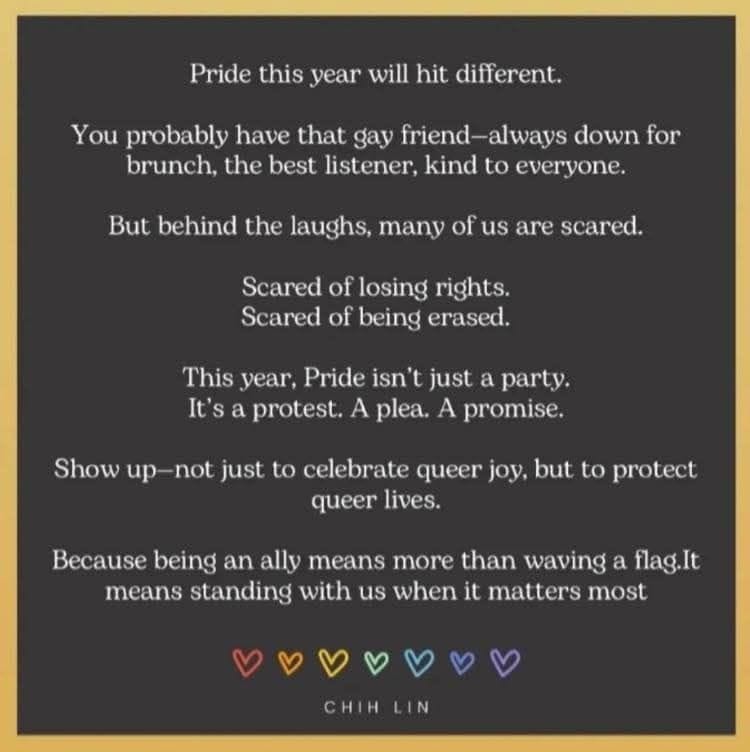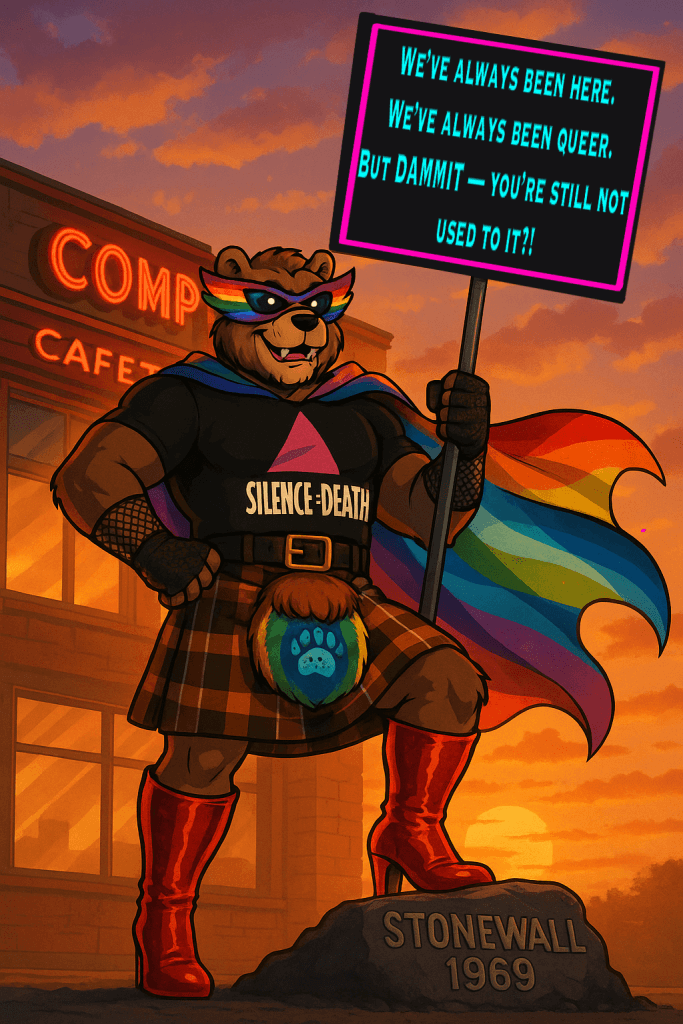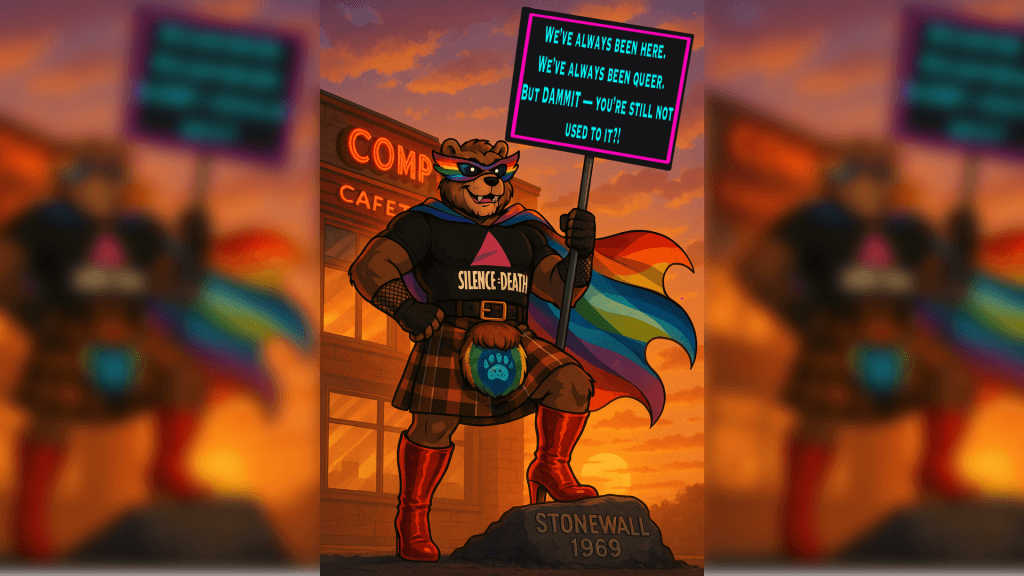Table of Contents
Pride 2025 Hits Different

A Brief Word from Techbear
My dear readers, Techbear here with something important.
Today I’m stepping back to let my human, Jason, speak directly. What you’re about to read isn’t my usual snarky take on tech culture—it’s Jason’s deeply personal response to a hate crime that happened during Pride Month 2025. As someone who is both gay and Choctaw, he needs to use his own voice for this one, and he’s about get all Julia Sugarbaker on y’all.
This is about more than tech. It’s about why our industry’s commitment to inclusion and human-centered design matters when lives are literally on the line. Jason’s going to tell you about Jonathan Joss, about professional silence, and about why DEI isn’t optional.
Take it away, Jason.
Pride this year will hit differently.
I’m both gay and Choctaw. Jonathan Joss’s murder hits me hard—personally and professionally.
When news broke about Jonathan’s murder (BBC News), I shared it on LinkedIn, writing: “This is absolutely a hate crime—He was gay and indigenous, and his husband is trans. THIS is why DEI matters.”
The Silence is Deafening
The silence on LinkedIn has been deafening. Apparently rainbow logos in June don’t extend to actual solidarity when hate crimes happen.
The second day of Pride Month 2025 was marked by a hate crime. It targeted a gay Indigenous actor at multiple intersections of his identity. His husband is trans. Our professional networks have largely looked the other way.
This is exactly why DEI isn’t just corporate buzzword bingo—it’s literally life and death.
What Happened to Jonathan
Jonathan was shot while checking his mail. That mail contained the skull of his murdered dog.
He and his husband had been driven from their home. Neighbors burned it down for being gay. San Antonio PD ignored his pleas for protection—police logs show more than 50 calls for help between January 2024 and February 2025.
As Jonathan lay dying from a close-range shot to the head, his alleged killer reportedly laughed and called his grieving husband a homophobic slur. Yet police claim there’s “no evidence” this was a hate crime.
His death reminds us that hate doesn’t operate in silos. It strikes where our identities meet—and it’s part of a larger pattern where Native lives and queer lives are often treated as disposable in this country. Those who live at the intersection of multiple marginalized identities are often at the greatest risk.
It’s exactly why diversity, equity, and inclusion work isn’t optional.
Fear Behind the Pride
This morning, I found a Facebook post that captured my feelings: “Pride this year will hit different.” It’s at the top of the page
It talked about that gay friend we all know. The one always down for brunch. The best listener. Kind to everyone.
But behind the laughs, many of us, including me, are scared:
- Scared of losing rights
- Scared of being erased
- Scared of checking our own mailboxes
As one author wrote about Jonathan’s case: “If it happened to an actor as famous as Jonathan Joss and nobody batted an eye…well, what does that mean for the plebs?”
Hard Questions for Tech Leaders
Gymnarctos Studios’ core values center on “Inclusion By Design” and “Human-Centered Technology.” This confronts me with hard questions:
- Are we designing for everyone’s safety and dignity?
- Are we creating digital spaces where people like Jonathan can thrive without fear?
- When we say “technology should work for everyone, period,” do we mean it when lives are literally on the line?
Professional Silence = Complicity
This isn’t just about tech. It’s about professional silence that speaks volumes about who we really are when the cameras aren’t rolling.
When hate crimes happen and LinkedIn stays quiet, we’re complicit. When our networks ignore intersectional violence, we’re part of the problem.
When companies treat DEI like optional nice-to-have rather than essential infrastructure for human dignity, we get a world where Jonathan Joss dies checking his mail while we debate whether inclusion initiatives are “too political.”
And here’s something else to consider: even if you think you’re safe, you may not always be. People discover new truths about themselves or their heritage every day—a hidden lineage, a shift in identity, a sudden disability. Privilege is not fixed. It can change in an instant. When it does, you might find yourself the target of the very systems you once thought didn’t apply to you.

Pride as Protest, Protection, and Promise
This year, Pride isn’t just a party. It’s three things:
Protest
In 1969, the original “Pride” was the Stonewall riot. Trans women, especially trans women of color, fought back against police and societal harassment. Maybe it’s time we channel that anger again.
Protection
Show up—not just to celebrate queer joy, but to protect queer lives.
Promise
A commitment to do better. To be better allies. To build safer spaces.
What Real Allyship Looks Like
Being an ally means more than your annual rainbow logo makeover. It means showing up when it’s uncomfortable, inconvenient, and costs something.
It means understanding that DEI work isn’t about checking boxes or avoiding lawsuits—it’s about creating a world where people like Jonathan, his husband, and I can exist safely at every intersection of their identity.
We don’t get to be free by protecting only the people who look like us, worship like us, or love like us. We get free by showing up for everyone who lives at the margins—because if one of us is a target, all of us are.
Solidarity cannot be conditional. Justice must be inclusive.
For those of us in positions of privilege—whether in tech, business, or any industry—we have a responsibility. We must use our platforms and power to protect the most vulnerable among us.
Remember Jonathan Joss

Please say his name: 🕯️ Jonathan Joss 🕯️
- Comanche
- White Mountain Apache
- Queer
- Beloved
- Never forgotten
Show Up This Pride
Please show up this Pride—not just for celebration, but for protection.
Not just for the party, but for the protest. Not just for the moment, but for the promise of a better tomorrow.
About the Authors
Techbear is my sequin-studded, fabulous tech diva alter ego who usually delivers the snark and sass about our industry’s absurdities. Today, he stepped aside because some things require a human voice.
I’m Jason, a gay Choctaw designer and technologist who believes technology should serve everyone’s humanity—especially those society tries to erase. When I’m not building inclusive digital experiences or calling out tech’s failures, I’m probably overthinking the intersection of identity, technology, and justice while my husband reminds me to eat actual food.
Gymnarctos Studios creates human-centered technology that works for everyone, period. We believe inclusion isn’t optional—it’s the foundation of ethical design. Our work spans accessibility consulting, inclusive product strategy, and building digital spaces where every person can thrive safely.
If this piece moved you to action, share Jonathan’s story. Say his name. Show up for your community. And if you’re ready to build more inclusive technology, we’re here to help make that happen.
Get In Touch
Have a tech question or need help navigating the digital landscape? We’d love to hear from you! Email us at gymnarctosstudiosllc@gmail.com.
- Want a response in TechBear’s fabulous voice? Put “Ask TechBear” in the subject line for helpful advice, sass, and a good-natured roast about your tech decisions.
- Have a serious business inquiry? Use a professional subject line and we’ll respond accordingly.

